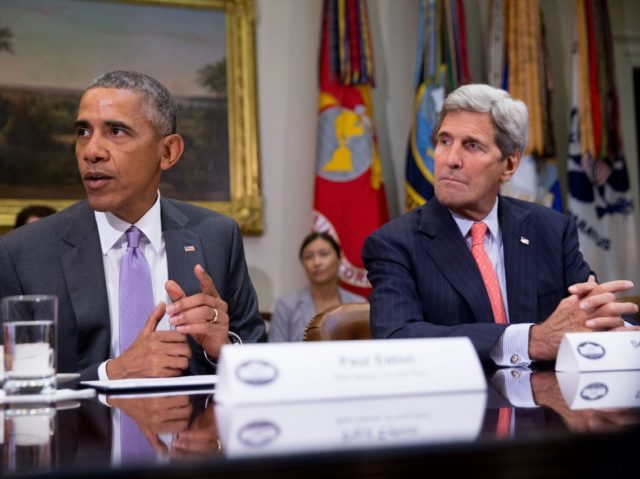President Barack Obama assured us last year the nuclear agreement he struck with Iran would improve relations with that country. But since then, the number of naval confrontations with Tehran has doubled and the mullahs have threatened to shoot down U.S. spy planes operating in international airspace.
Even to the most fervent Obama supporters, such developments suggest the nuclear deal has done nothing to improve relations with an Iranian leadership that now, under that agreement, will obtain a nuclear arsenal either sooner (if done illegally) or later (if done legally).
Developments earlier this month involving U.S. Navy ships operating in the international waters of the Red Sea — and an award that may soon be issued to sailors onboard them — would reflect, on paper at least, what Obama refuses to admit publicly.
The three Navy ships — USS Ponce, USS Mason and USS San Antonio — were targeted in two separate missile attacks (a reported third attack appears now to have been a false alarm).
On October 9th, two high-speed, guided missiles were fired at Ponce from Yemen’s southern coastline, in territory controlled by anti-government Houthi rebels. Mason immediately fired missiles to intercept them. Whether the intercept worked or not is unknown but the inbound missiles splashed down within ten miles of Ponce.
Undeterred, the Houthis launched a second attack on October 12th. This involved a single missile that raced toward Mason and San Antonio. Again Mason responded, activating her missile defense system. And, again, an incoming Houthi missile hit the water short of its mark.
On October 13th, the Navy launched a retaliatory cruise missile strike, destroying three Houthi radar sites involved in guiding the missiles in the two earlier attacks against the U.S. ships.
An important connection here is the Houthis have long been supported in their civil war against the ousted Yemeni government by Iran’s mullahs. There should be little doubt, therefore, the Houthis did not act independently of their Iranian puppet masters in launching missiles at U.S. targets.
In fact, U.S. Central Command leader Army Gen. Joseph Votel—the top U.S. commander in the Middle East—has suggested such. In what is the closest acknowledgement of Iranian involvement in the attacks, Vogel said, “I do think that Iran is playing a role in some of this. They have a relationship with the Houthis, so I do suspect there is a role in that.”
Clearly calling Iran out on the Houthi missile attacks puts Obama, who believes the mullahs can do no wrong, in a difficult position.
Interestingly, issuance of an award to hundreds of sailors onboard the three Navy ships targeted by Houthi missiles may carry with it a subtle change in labels in Iran’s relationship with the U.S., from one Obama portrays as friend to one more accurately defined as foe.
Navy regulations allow for the Combat Action Ribbon (CAR) to be awarded to personnel who “have participated in a bona fide ground or surface combat fire-fight or action during which he/she was under enemy fire and his/her performance while under fire was satisfactory.” Because personnel on ships have rarely come under enemy fire in recent conflicts, the last time the CAR was awarded the crew of a ship operating in international waters was the 1991 Gulf War.
While entitlement to the CAR for these sailors may seem like a slam-dunk, we must remember the government’s rationale in failing to award the Purple Heart to U.S. soldiers killed or wounded in 2009 at Fort Hood by self-professed Islamic fanatic and fellow soldier Major Nidal Hasan.
While the Department of Defense (DOD) crafted its opposition to awarding victims a Purple Heart on the basis it would “irrevocably alter the fundamental character of this time-honored decoration” and “undermine” Hasan’s prosecution, the real rationale was it required labeling the Islamist shooter an “enemy.” Doing so would undermine Obama’s effort not to link Islam in any way to acts of terrorism. It took an act of Congress to broaden the medal’s strict eligibility requirements to rightfully get the victims their Purple Hearts.
While the missile attacks earlier this month against Navy ships came from Houthi-held territory where these rebels’ actions are now acknowledged to be dictated by the mullahs, awarding the CAR to U.S. sailors on targeted ships indirectly indicts Iran as “the enemy.”
Will DOD slip one by Obama this time and award the CARs? Or is an award entitlement, rightfully earned by those in uniform who found themselves in harm’s way, to be denied allowing Obama, again, to hide the identity of a true enemy?
Lt. Colonel James G. Zumwalt, USMC (Ret.), is a retired Marine infantry officer who served in the Vietnam war, the U.S. invasion of Panama and the first Gulf war. He is the author of “Bare Feet, Iron Will–Stories from the Other Side of Vietnam’s Battlefields,” “Living the Juche Lie: North Korea’s Kim Dynasty” and “Doomsday: Iran–The Clock is Ticking.” He frequently writes on foreign policy and defense issues.

COMMENTS
Please let us know if you're having issues with commenting.